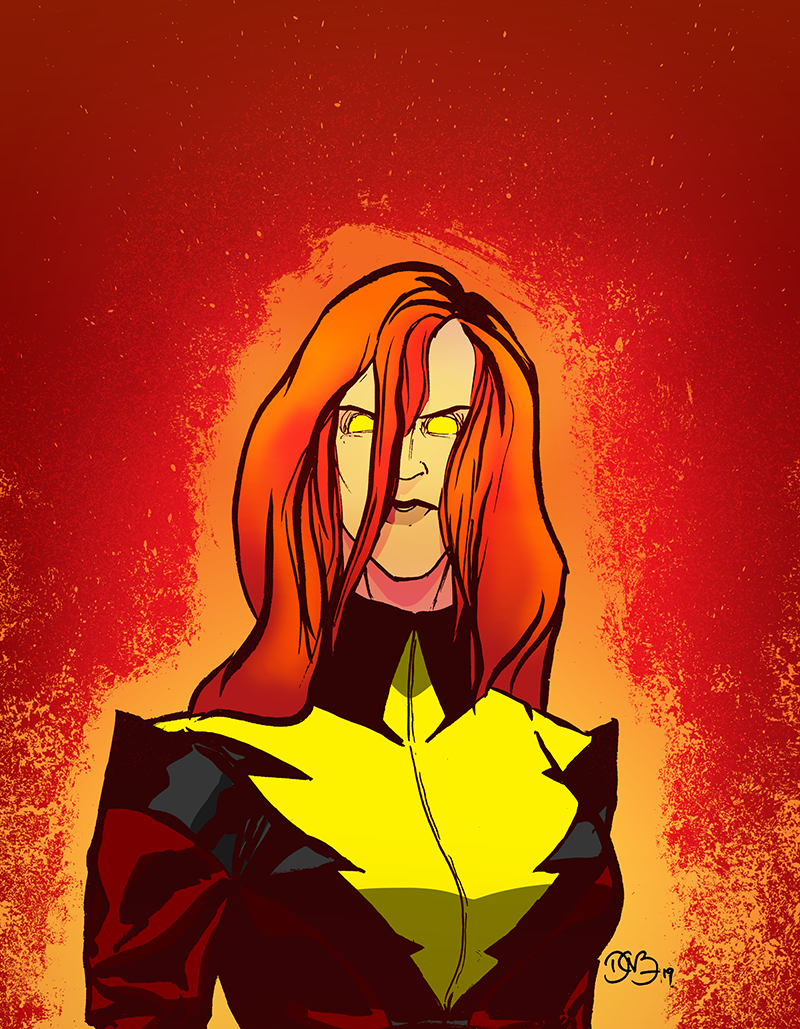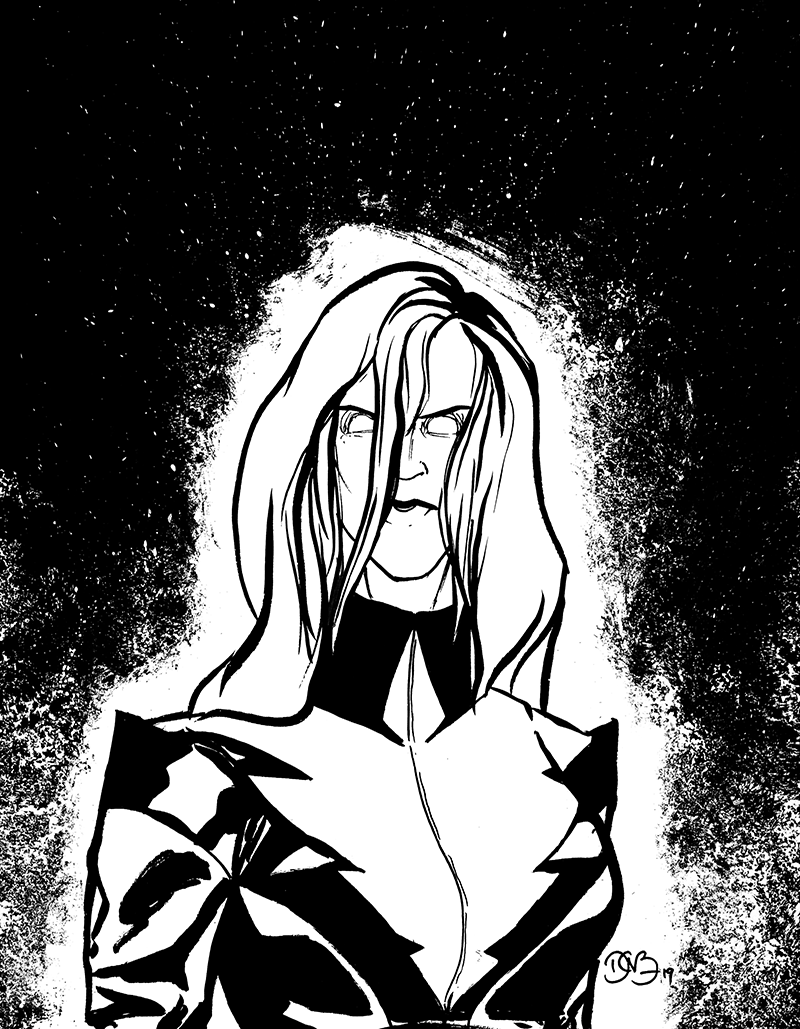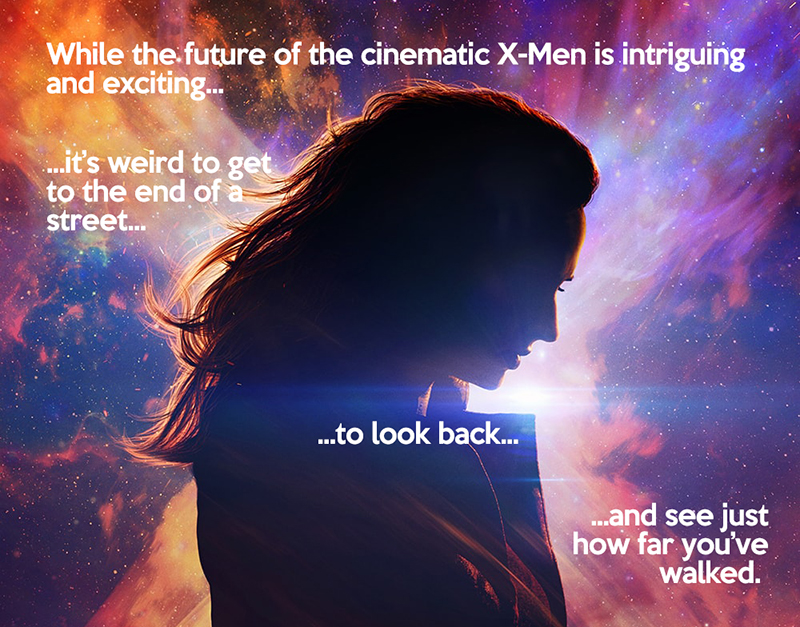Sketch Fridays #64 – Dark Phoenix

When Avengers: Endgame hit theaters, I was surprised by the strong emotional response people were having to the film. There were, of course, the life-long comic book fans, the people who––when growing up––were bullied or maligned for liking comics and video games instead of sports and cars or something. It’s not surprising that when, decades later, you see everybody lining up to see the newest Avengers movie that you feel a bit of vindication. Furthermore, when you see on screen the stuff you read about as a kid––armies of heroes lining up and facing off against villainous armies––that hits you hard. You always knew it could be done and, when it was, it would be amazing.
Then there were the other people that were emotionally affected by the movie, and this group I hadn’t considered at all. They were the people who were not, necessarily, comic book fans or, if they were, they started reading comics because of the movies. More than anything, they were fans of the movies and Avengers: Endgame marked a definitive end point for the continuity that had started back with Iron Man in 2008. Or, to a lot of viewers, when they were ten years old and the Marvel Cinematic Universe had been a road they walked along their entire adult lives, a cultural and personal touchstone that they could always count on and refer back to.
To them, the MCU and its characters––Iron Man, Captain America, Thor, etc.––were always there and, with Endgame, it hit the audience with a dose of practical awareness that––at some point––they’d have to move on and let some characters go. It marked a moment when the fan would have to step off the curb, so to speak, without the people (meaning the actors and the characters they played) that they had walked with for much of their conscious life. That can definitely be a hard realization to have.
Watching Dark Phoenix––the final X-Men film (and penultimate X-related film) to be produced by 20th Century Fox before Disney acquired the company at the beginning of the year––ended up being a startlingly powerful experience for me; an experience that pulled me in a lot of directions. The nostalgia and sense of personal attachment to these movies were what hit me most as credits on Dark Phoenix rolled.

That being said, it’s the last of a line of movies––most of which are good (I’ll admit that two are mostly bad and one is atrocious)––that stretches back to 2000 with the release of X-Men, a movie that also hit me hard.
When the first X-Men movie released, I was working at a movie theater. Though I had fallen off of comics by that point, I still had my old issues and did return to those stories every now and then. But the X-Men and their metaphor and mission were always there, rattling around my head, and I went into the movie with a nuanced interpretation of what the X-Men were.
X-Men startled me with how well it captured what the X-Men meant, to me at least. Even though they didn’t look like their comic counterparts with bright costumes (their attempt at Logan’s hair was valiant), they captured the characters wholly. Walking out, all I thought was that the filmmakers “got” the X-Men, and I couldn’t wait to see it again.
What’s more is that the world “got it”, too, and the X-Men became household names and everybody knew what they were about. More than just superheroes, they were the excluded, the shunned, and the hated who were fighting for a better world for everybody. It was my first real cultural validation for something that previously had been brushed away as mere childish things. At the time of Dark Phoenix‘s release, the world seems to have moved on, but I still walked into that theater hoping that this installment continued to “get” these characters that mean so much to me.

While I realized at the time how important Avengers: Endgame was to those in their twenties, it’s only really now that I can sympathize. Nineteen years and twelve movies later, it’s over. Nineteen years is half of my life. There have been good movies and bad movies (mostly good movies), and I love them for all of their flaws and strengths.
Again, the X-Men are my superheroes, the only ones I really care about. I’m the weirdo who would rather watch X-Men: Apocalypse again on his free time instead of Avengers: Infinity War because I’m that weirdo. However, I won’t be the guy to argue it’s better. To me, there’s no comparison––in my head there are the X-Men movies that I will watch and look forward to and then there are “superhero movies” from the MCU and DC and whoever else. While I like the MCU movies, I don’t particularly care for the characters. By contrast, I love the X-characters. I get more satisfaction just seeing them on screen than I do any other comic book character. Again, that’s my quirk, and I know it.
The X-films rose and fell in the public eye, but they were always there and I always saw them. And now they’re done. While the zeitgeist has cast the X-films in a certain light and condemned this film by pointing to aggregate review sites and making unfair comparisons, I’m happy that Dark Phoenix is a good movie.
While the future of cinematic X-Men is intriguing and exciting, it is weird to come to the end of a street, to look back and see just how far you’ve walked.

Discussion (3) ¬